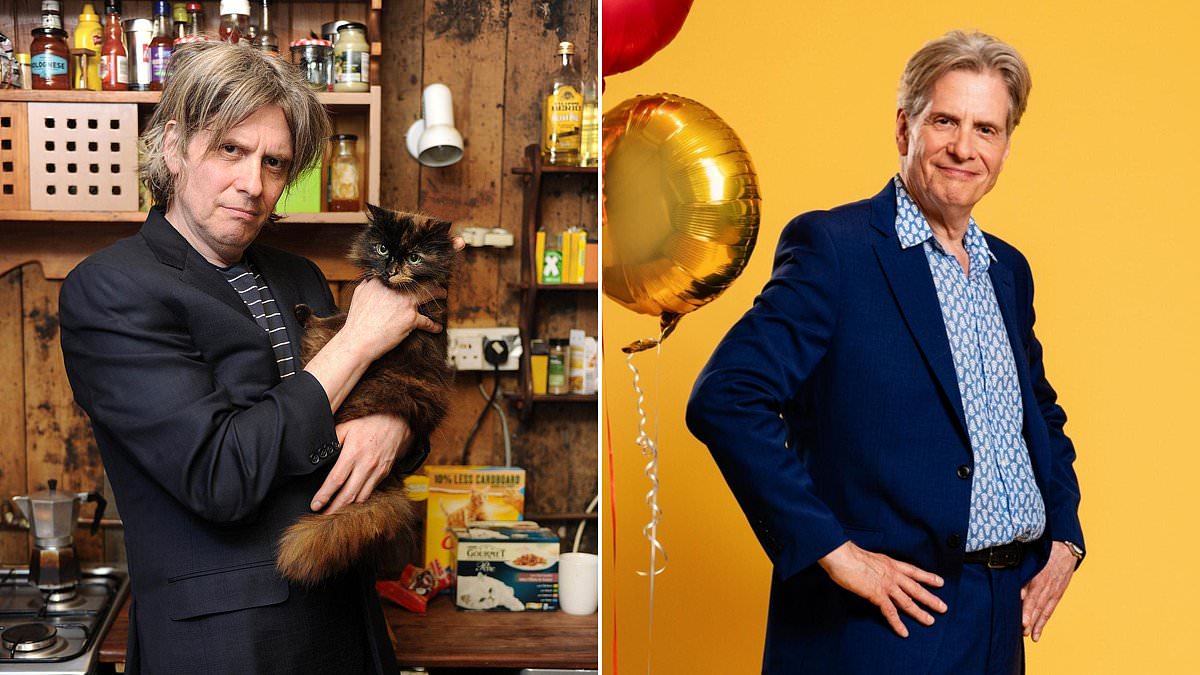I’m 71 – but my body clock says I’m only 36. Here’s how I’ve reversed my age: COSMO LANDESMAN
By Cosmo Landesman,Editor
Copyright dailymail

When a friend told me he was planning to live for 114 years, I thought he was joking. But then he told me he’d joined the Million Hour Club – the idea being that 114 years equals a million hours.
A group of people all aiming to reach that milestone and beyond? It sounded crazy to me. Who, I wondered, would want to live that long?
These days a lot of people do. Longevity has become the lifestyle trend of our time. One estimate put the global longevity industry at £25 trillion in 2022, and projected it to reach £30 trillion by 2026. There are around 55 longevity clinics in the UK and even upmarket spas and gyms are rebranding themselves as ‘longevity centres’.
I’ve always been sceptical about the claims of so-called experts in the field with their pseudo-scientific talk of ‘biohacking’, ‘data tracking’ and ‘superfoods’. (I even read one claim that four cups of a certain soya bean could add four years to your life!) And don’t get me started about those books with titles like How Not To Die.
Then there are the billionaires involved in the longevity movement, including Bryan Johnson, 48, famous for swallowing more than 111 pills a day and spending £1.5 million a year to reverse the ageing process. He used to transfuse the blood of his teenage son into his own body.
I was convinced that the whole thing was just hi-tech snake oil. Six months later and I’m a convert! Yes, I drank the Kool-Aid – or maybe that should be the spinach, kale and seaweed smoothie topped with flaxseed. I’ve become a longevity believer and, according to some of my friends, a hardcore health bore.
Once I rolled my eyes at people who banged on about their gluten intolerance – reader, today I stand before you gluten free. I don’t drink. Smoke. Eat red meat. I take 15 vitamin supplements a day and numerous herbal remedies. I exercise regularly, de-stress with breathing sessions and get seven hours of sleep a night. I’ve never felt better – and I suspect that I’ve never been so boring. I went on a date recently and I found that I was telling her about the state of my fungal dysbiosis (not good) and my formiminoglutamic acid (pretty good) and I could see her eyes glaze over.
How did this happen to me? Around six months ago I joined my friend’s Million Hour Club, which was founded last year by Dr Alka Patel, 52, a former NHS GP who has become a longevity expert.
The club – which has 243 members – costs £4,114 per year (no, I’m not paying). For that you get 114 biomarkers (indicators of your health) tested twice a year and a biological age test every 114 days. Dr Patel then reviews your results and advises what actions to take. You also get access to cutting-edge tests such as cancer detection and private consultations with Dr Patel. She deals personally with her clients via her Million Hour Club app.
It’s an online community of people, mostly between the ages of 35 and 55, who discuss targets and give each other encouragement via the app and fortnightly Zoom interactions. It’s like WeightWatchers for people who don’t want to die.
Why did I join? Partly because I’m already 71 and want to live beyond the UK male average of 79. More importantly, I fear the ravages of old age. I saw what growing old did to my parents; the decline in their mental and physical state was sad and scary. My mum with her aches and pains would say to me, ‘Do yourself a favour, don’t grow old!’
For me, joining the Million Hour Club was a form of preventive medicine. ‘People treat their health reactively – waiting for a diagnosis or scare before they do something,’ says Dr Patel. She believes you can slow down and reverse the ageing process.
How? The key scientific idea is that you can control your ageing process by controlling your level of inflammation – because that is what rusts your cells, damages your DNA and fast-forwards your biological clock. Dr Patel believes you have to look at each person’s ageing process – known as inflammaging – to see what is happening and what you need to do to slow it down.
To this end Dr Patel took a sample of my blood, urine, saliva and even poo. This is not the usual once-a-year check-up a GP might give you. Dr Patel analyses biometrics of old age – your chromosomes, body tissue, DNA, the state of your gut, and every little microbe, enzyme and neurotransmitter that is you. She goes through the results and gives you advice on what you need to do to slow down or reverse your ageing – and the rest is up to you.
The first thing I discovered from my metabolic report was that while I may be chronologically 71 years old, in terms of my biology I’m just 36! It sounds more impressive than it is. It’s done by measuring chronic inflammation in your system. It can provide insights into potential health risks and areas for early intervention.
Now for the bad news.
I found things about my body and chemistry I never knew existed. Have you ever heard of oxidative stress, 80HDG, lipid peroxides, mitochondrial dysfunction and omega-3 imbalance? No? I have all of them and they’re all risk factors for cancer, Parkinson’s disease, Alzheimer’s and can damage your cells and tissues.
Dr Patel has put me on vitamin supplements, listed foods to avoid and suggested lifestyle changes that have set my mind at ease. She has got me living on antioxidants like berries, broccoli and green tea. I’ve got oily fish – salmon, sardines (which I hate) and anchovies (which I hate even more) – coming out of my ears. I’m taking black walnut tincture, liquorice root, humic acid gut repair and a vast variety of vitamins. Dr Patel offers a customised pill supplement for £200 a month, but instead I spend around £50 a month at Holland & Barrett.
It was the report on the state of my gut that freaked me out. My gut lining is torn, causing leakage. I have digestive dysfunction and my flora bacteria lack diversity. To top it all I have a living parasite in me – Giardia lamblia – that’s causing inflammation and gut barrier breakdown, and is associated with diarrhoea, cramps, gas and a host of other unpleasant things.
For Dr Patel the key to a long, healthy life is based on lifestyle factors. ‘I always say that lifestyle determines lifespan,’ she says. ‘You don’t just inherit your health – you create it. How you sleep, eat, move, connect, modulate stress. These are the switches that turn the process of ageing on and off.’
My gut report goes a long way in explaining the bad indigestion I’ve had for four decades. Some men smell of aftershave; I reeked of Gaviscon. Dr Patel got me to chew my food 20 times a mouthful and to eat quietly and calmly. It’s paid off – my indigestion has disappeared. I’m not a wow at dinner parties any more, but so what?
It was tough at first. I thought, what’s the point of living if I can’t have a piece of toast and apricot jam with my morning coffee? So what if the next piece of chorizo brings on a heart attack – I’ll die with a smile on my face!
But I stuck to the Million Hour Club programme and nowadays I don’t miss those things. Kate Moss once said nothing tastes as good as skinny feels; I say nothing tastes and looks as good as being healthy feels. I’m still sceptical about the idea that anyone can live to 114 or beyond. When I first met Dr PateI, I said, ‘Do you really believe it?’ She paused and said, ‘Yes, everyone has the potential to do that.’
The statistics say it’s possible, but it rarely happens. Lucile Randon – a French nun – lived to 118 (she died in 2023). And science says that we can slow down the rate of ageing through diet, exercise, relaxation and social connection. But, of course, there are hereditary and environmental factors that can’t be controlled.
There are people in the Million Hour Club who are aiming to live even beyond 114. Dan Gray, 38, and his wife Sara, 40, are relationship coaches with two young sons. Both have made vows to each other to live to 133!
I won’t be around to find out if they reach their goals. And I don’t think it really matters. Having the aspiration to live as long and as well as you can manage is good enough.
Right now, I can honestly say I have more energy, more vitality, better focus and I’m less prone to fatigue and daily bouts of melancholy than before. I’m no longer drifting into inevitable decline. I’m living the dream – one day, two smoothies and 15 pills at a time.



